Can Air Conditioner Make You Dizzy? Expert Insights And Remedies
Yes, air conditioners can potentially make you dizzy. This can happen due to several reasons: 1. Cold air blowing directly on your face can cause a drop in blood pressure, leading to dizziness. 2. Dry air from the air conditioner can cause dehydration, leading to dizziness. 3. If the air conditioner is not properly maintained, it can accumulate mold or other allergens that can cause dizziness in sensitive individuals.
Imagine stepping into a cool, air-conditioned room after a sweltering day outside. Ah, sweet relief.
But what if that refreshing blast of chilled air leaves you feeling disoriented, dizzy, and downright uncomfortable? Yes, you read that right. Air conditioners, those modern marvels of temperature control, can make you dizzy.
Before you dismiss it as a mere inconvenience, consider this: the effects of air conditioning on our bodies can go beyond discomfort, affecting productivity and overall well-being. For those who experience dizziness or disorientation in the presence of air conditioning systems, understanding the causes and finding solutions becomes paramount. Yet, the root cause may not always be apparent, leaving individuals grappling with discomfort and struggling to pinpoint the culprit behind their symptoms.
Is it the temperature? The air circulation? The sudden change in temperature? As we delve into the topic of air conditioning and its potential to induce dizziness, we’ll explore the physiological factors at play, uncover possible triggers, and offer practical solutions to help you regain your equilibrium. Whether you’re seeking a basic understanding of the issue or already possess a more advanced knowledge, this article will provide valuable insights into the impact of air conditioning on your well-being. So sit back, relax, and prepare to discover the surprising connection between air conditioners and dizziness.
Understanding the Physiology of Dizziness
Before we dive into the potential causes of dizziness induced by air conditioning, it’s essential to understand the physiology behind this uncomfortable sensation. Dizziness can manifest in various forms, including lightheadedness, imbalance, vertigo, and a spinning sensation.
Inner Ear and Balance
The inner ear plays a crucial role in maintaining our sense of balance. It consists of several structures, including the vestibular system, which contains fluid-filled canals and sensory receptors responsible for detecting head movement and providing feedback to the brain.
When we experience dizziness, it often stems from an imbalance or disruption in the signals sent from the inner ear to the brain. This discrepancy in the vestibular system can be triggered by a range of factors, including changes in temperature and air pressure.
Affected Groups
Not everyone is equally susceptible to feeling dizzy in the presence of air conditioning. Some individuals may be more prone to experiencing these symptoms due to certain predisposing factors.
One such group is individuals with preexisting inner ear conditions, such as Meniere’s disease or vestibular migraine. These conditions can make the person more sensitive to changes in temperature and air pressure, increasing the likelihood of dizziness.
Additionally, people with low blood pressure or poor circulation may also find themselves more susceptible to dizziness, as air conditioning can potentially constrict blood vessels and affect blood flow.
The Role of Temperature
Temperature is a significant factor when it comes to the relationship between air conditioning and dizziness. Sudden and extreme changes in temperature can disrupt the body’s internal thermoregulation, leading to physiological and sensory responses that may induce dizziness.
Rapid Temperature Changes
When we move from a hot environment to a cold one and vice versa, our bodies need time to adjust. However, air conditioning often creates rapid temperature changes that can catch our bodies off guard.
These abrupt shifts in temperature can cause our blood vessels to constrict or dilate quickly, affecting our blood pressure and circulation. Such changes can disorient the body, leading to feelings of dizziness and lightheadedness.
Dehydration and Dry Air
Another factor to consider is the potential for air conditioning to contribute to dehydration. As air conditioners cool the air, they also remove moisture, leading to dry indoor environments.
Excessive dryness can cause our bodies to lose water through increased respiration and perspiration, potentially leading to dehydration. Dehydration, in turn, can cause symptoms such as dizziness, fatigue, and decreased cognitive function.
Therefore, it’s important to stay adequately hydrated when in air-conditioned spaces to minimize the risk of dizziness and other related symptoms.
Addressing Air Circulation
In addition to temperature, the circulation of air within an air-conditioned space can also play a role in inducing dizziness. Poor air circulation can result in stagnant or “stale” air, which may lead to a variety of discomforts.
Stagnant Air and Indoor Pollutants
If an air conditioning system does not effectively circulate and filter air, it can contribute to the accumulation of indoor pollutants. These pollutants can include dust, allergens, and volatile organic compounds (VOCs), which can be harmful when inhaled in high concentrations.
Inhaling these pollutants can irritate the respiratory system, potentially leading to symptoms such as dizziness, headaches, and general discomfort.
Improving Air Quality and Circulation
To mitigate the risk of dizziness caused by poor air circulation and indoor pollutants, several steps can be taken:
- Regularly clean and replace air filters in your air conditioning system.
- Ensure proper ventilation by opening windows or using fans to promote fresh air circulation.
- Utilize air purifiers to filter and remove indoor pollutants.
By improving air quality and circulation, you can create a more comfortable and dizziness-free environment.
Solutions for Dizziness Relief
If you find yourself feeling dizzy in the presence of air conditioning, there are various strategies you can employ to alleviate the discomfort and regain your equilibrium.
Gradual Temperature Transitions
Instead of subjecting your body to sudden temperature changes, try to make the transition from hot to cold or cold to hot more gradual. This approach allows your body to adapt to the changing conditions, reducing the risk of dizziness.
For example, if you’ve been exposed to the heat for an extended period, spend a few minutes in a moderately air-conditioned space before entering a fully air-conditioned environment.
Stay Hydrated
As previously mentioned, dehydration can contribute to dizziness. To combat this, make sure to drink plenty of water throughout the day, especially when in air-conditioned environments.
Additionally, you can increase your water intake by consuming hydrating foods such as fruits and vegetables or opting for beverages with electrolytes.
Take Breaks
If you’re spending an extended period in an air-conditioned space, be sure to take regular breaks. Stepping outside or into a more naturally ventilated area can help your body readjust and minimize the potential for dizziness.
Consider Alternative Cooling Methods
If air conditioning consistently triggers dizziness or discomfort, exploring alternative cooling methods may be worth considering. Fans, evaporative coolers, or natural ventilation can provide relief without the abrupt temperature changes associated with air conditioning.
Air conditioning has undoubtedly revolutionized our ability to control indoor temperatures and create a comfortable environment. However, it’s essential to be aware of the potential for dizziness and discomfort that can arise from its use.
By understanding the physiological factors behind dizziness and implementing strategies to address temperature, air circulation, and hydration, you can minimize the risk of feeling dizzy in the presence of air conditioning.
Remember, everyone’s experience with air conditioning is unique, and what may cause dizziness for one person may not affect another. If your symptoms persist or worsen, it’s always advisable to consult with a healthcare professional for further evaluation and guidance.
Is Air Conditioning Making You Sick?
Can air conditioner make you dizzy?
Why does an air conditioner make you dizzy?
How to prevent dizziness caused by air conditioners?
Can air conditioner affect your balance?
When should I seek medical help if I feel dizzy due to the air conditioner?
Final Thoughts: Minimizing Dizziness in the Presence of Air Conditioning
In conclusion, air conditioning can potentially make you dizzy due to various factors. Dizziness is often caused by disruptions in the signals sent from the inner ear to the brain, which can be triggered by changes in temperature and air pressure.
Certain individuals, such as those with preexisting inner ear conditions or low blood pressure, may be more susceptible to experiencing dizziness in the presence of air conditioning. Rapid temperature changes and dehydration caused by air conditioning can also contribute to dizziness.
Additionally, poor air circulation and the accumulation of indoor pollutants can lead to discomfort and dizziness. To alleviate dizziness, gradual temperature transitions, staying hydrated, taking breaks, and considering alternative cooling methods can be helpful. It’s important to maintain good air quality and circulation by regularly cleaning air filters, ensuring proper ventilation, and using air purifiers.
However, it’s crucial to remember that everyone’s experience with air conditioning is unique, and if dizziness persists or worsens, it’s recommended to seek medical advice. By understanding the physiology behind dizziness and implementing strategies to address its potential causes, you can minimize the risk of feeling dizzy in the presence of air conditioning.






